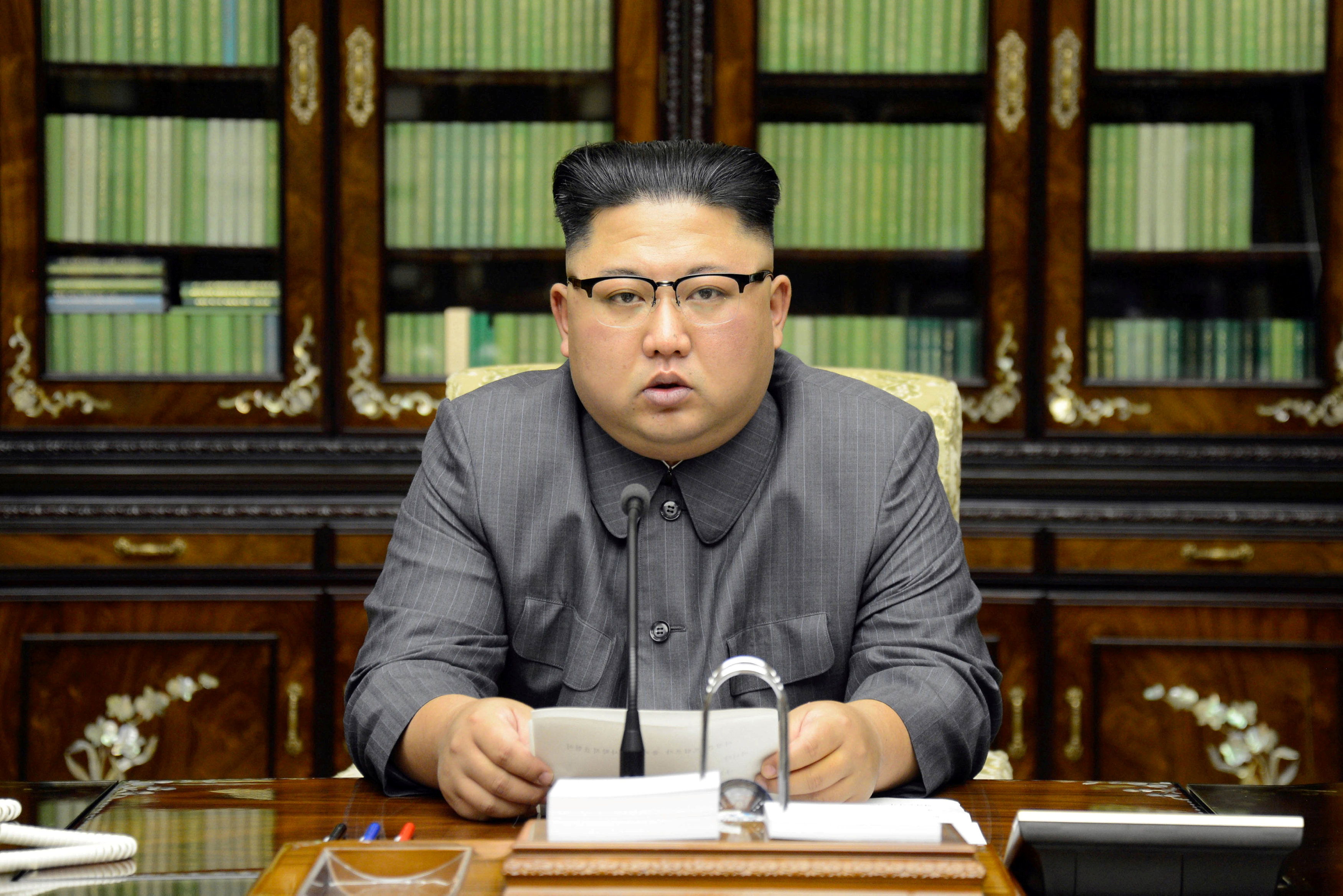I have studied North Korea for over a decade. This crisis is different.
The North Korea crisis has reached a tipping point


A free daily email with the biggest news stories of the day – and the best features from TheWeek.com
You are now subscribed
Your newsletter sign-up was successful
Is war between the United States and North Korea looming? Or is the latest rhetoric coming from both sides just simply 21st-century chest pounding that will only result in more tough talk? As someone who has studied all things Asia and North Korea for over a decade, this latest crisis seems very different than previous ones — and it has me losing a lot of sleep.
Take for example this fiery statement from the North Korean government. In speaking to reporters on Monday, North Korean Foreign Minister Ri Yong Ho said his nation has "the right to shoot down the United States strategic bombers even [if] they're not yet inside the airspace border of our country." The remark followed the release of a fictional video showing Pyongyang's military attacking U.S. naval and air forces.
Yikes.
The Week
Escape your echo chamber. Get the facts behind the news, plus analysis from multiple perspectives.

Sign up for The Week's Free Newsletters
From our morning news briefing to a weekly Good News Newsletter, get the best of The Week delivered directly to your inbox.
From our morning news briefing to a weekly Good News Newsletter, get the best of The Week delivered directly to your inbox.
What worries me — way more than the rhetoric — is that North Korea's growing military capabilities are now at a tipping point. North Korean leader Kim Jong Un will continue to test ever-more advanced missile and nuclear weapons designs over the coming months and years; it is the only way to guarantee he can deliver an atomic payload to the U.S. homeland. His dream of having the ability to forestall some imagined future U.S. invasion to throw his regime into the scrapheap of history seems almost, if not already, in his grasp. We should all know the drill by now: A missile goes up, and the world's collective stress level goes even higher.
The question now is whether tensions boil over to full-blown war. While we are not there yet, I would argue we are the closest to conflict on the Korean peninsula than any other time since the Korean War — a war that never officially ended. I would even guess that the odds of war breaking out between the United States and North Korea within the next six months are one in three. That's not something I ever thought I would write.
Unless immediate steps are taken to walk back from the brink, Washington and its allies could be in for a fight with a nuclear-armed rogue regime that will have no reason to hold anything back — including the use of chemical, biological, and nuclear weapons. And that could mean U.S. cities coming under attack from North Korea's atomic "fire."
Where this all goes over the next 30 days is the key.
A free daily email with the biggest news stories of the day – and the best features from TheWeek.com
The good news, if there really is any when it comes to North Korea, is that I don't see Pyongyang attacking our bombers, carriers, or troops in Northeast Asia. What I would look for in the coming days is a test of North Korea's missile capabilities — and that can only mean a test of an ICBM.
But this next test will be very different. It will not be like the two ICBM tests this summer, where Kim's rocketeers fired their missiles straight up in the air. Pyongyang will instead shoot missiles into the South Pacific to show just how far the weapons can go — and that they can indeed strike the U.S. homeland. In fact, if history is a guide, Kim will actually do this on several occasions, not only to demonstrate to the world that his nuclear arsenal is ready for primetime, but also to test new updates to his missile designs. Speaking of which, as North Korea develops new missiles in the years to come — especially mobile, solid-fueled ICBMs — Pyongyang will need to test those as well. Just as other nuclear powers do regularly, Kim will likely never stop testing his weapons as long as the regime exists.
There is now an obvious question in front of the U.S. and its Asian allies: Can they live with a rogue regime that will continue to display the means in which it can kill millions of people? Can, in fact, the wider world accept North Korea as a nuclear power that will have the capability to destroy Seoul, Tokyo, and Los Angeles, and, eventually, Washington, Sydney, London, or Paris? If so, we will have to implement policies — essentially a mix of sanctions, containment, and old-fashioned nuclear deterrence — to contain and slow the rate of growth of these programs.
But if the Trump administration sees in North Korea a regime that can't be deterred, as National Security Adviser H.R. McMaster has alluded to, then the only other path is war and regime change. Such a conflict could cost millions of lives and trillions of dollars in damage. Large tracts of Asia and even America could be left uninhabitable thanks to radioactive fallout.
Unfortunately, because of the growth rate of North Korea's missile program, these questions cannot remain unanswered for much longer. Very soon, Kim Jon Un will force the United States to make up its mind.
My advice: If containment worked against the Soviet Union and its allies, who posed a real existential threat to the West, then it can work against a country whose economy is one-third the size of Ethiopia's. Let's not presume war is the only answer.
Harry J. Kazianis is director of defense studies at the Center for the National Interest, founded by former U.S. President Richard M. Nixon.
-
 Tourangelle-style pork with prunes recipe
Tourangelle-style pork with prunes recipeThe Week Recommends This traditional, rustic dish is a French classic
-
 The Epstein files: glimpses of a deeply disturbing world
The Epstein files: glimpses of a deeply disturbing worldIn the Spotlight Trove of released documents paint a picture of depravity and privilege in which men hold the cards, and women are powerless or peripheral
-
 Jeff Bezos: cutting the legs off The Washington Post
Jeff Bezos: cutting the legs off The Washington PostIn the Spotlight A stalwart of American journalism is a shadow of itself after swingeing cuts by its billionaire owner
-
 Epstein files topple law CEO, roil UK government
Epstein files topple law CEO, roil UK governmentSpeed Read Peter Mandelson, Britain’s former ambassador to the US, is caught up in the scandal
-
 Iran and US prepare to meet after skirmishes
Iran and US prepare to meet after skirmishesSpeed Read The incident comes amid heightened tensions in the Middle East
-
 Israel retrieves final hostage’s body from Gaza
Israel retrieves final hostage’s body from GazaSpeed Read The 24-year-old police officer was killed during the initial Hamas attack
-
 China’s Xi targets top general in growing purge
China’s Xi targets top general in growing purgeSpeed Read Zhang Youxia is being investigated over ‘grave violations’ of the law
-
 Panama and Canada are negotiating over a crucial copper mine
Panama and Canada are negotiating over a crucial copper mineIn the Spotlight Panama is set to make a final decision on the mine this summer
-
 Why Greenland’s natural resources are nearly impossible to mine
Why Greenland’s natural resources are nearly impossible to mineThe Explainer The country’s natural landscape makes the task extremely difficult
-
 Iran cuts internet as protests escalate
Iran cuts internet as protests escalateSpeed Reada Government buildings across the country have been set on fire
-
 US nabs ‘shadow’ tanker claimed by Russia
US nabs ‘shadow’ tanker claimed by RussiaSpeed Read The ship was one of two vessels seized by the US military
